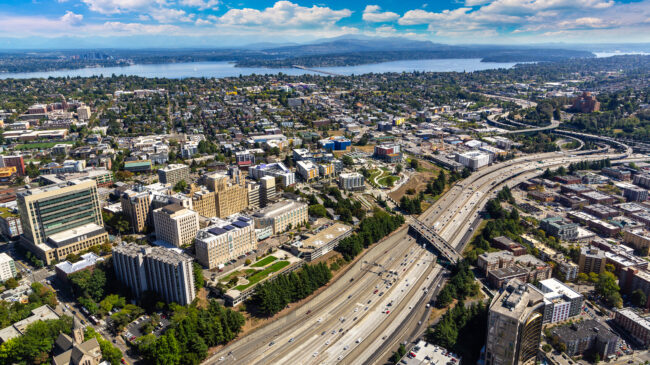For the past 100 years, Washington’s highway network has depended on per-gallon taxes on gasoline and diesel fuel. The gasoline tax was first enacted in neighboring Oregon in 1919, and within a decade it was adopted by all of the then-48 states. Nearly all states dedicated the revenue from these fuel taxes to the construction and maintenance of their roadway systems. Unfortunately, Washington state’s fuel tax has become unsustainable as a long-term revenue source for two reasons.
First, combustion-powered automobiles are becoming more fuel-efficient.
Second, the number of electric and hybrid vehicles is increasing exponentially. The tax has been compared to a rock star on his farewell tour. The fuel tax has served Washington state well for 100 years, but it is time to begin considering a more sustainable user fee as its replacement.
This problem of declining highway revenues was first studied by a special committee of the Transportation Research Board of the National Academy of Sciences in 2005. It concluded that fuel taxes would not remain viable as the primary highway funding source for the 21st century.
In response, Congress created the National Surface Transportation Infrastructure Financing Commission to examine how surface transportation should be funded over the long term. After considering many different alternatives, the commission concluded that (1) the original users-pay/users-benefit principle should be retained and (2) the best way for users to pay would be a charge per mile driven, rather than per gallon consumed. The commission also recommended that the road usage charges (RUCs) replace the fuel taxes, rather than supplement them.
In the 16 years since that Financing Commission report, Congress has authorized federal funding for state departments of transportation (DOTs) to carry out a number of pilot projects in which motorists and truckers operate their vehicles under a hypothetical RUC collection system. In Washington, the State Transportation Commission (WSTC) was tasked with determining whether RUCs could be a replacement for the fuel tax.
The commission created a 30-member steering committee consisting of state legislators, stakeholders, and associations that represent various interest groups from throughout the state. The committee oversaw a 2018 statewide pilot consisting of a little over 2,000 drivers.
In 2020, after analyzing the results of the pilot, the WSTC issued a number of suggestions to the legislature and governor for pursuing a gradual transition to an RUC system.
However, before any transition occurs, Washington policymakers need to answer several questions about how the RUC revenue will be used, RUC program options, and the privacy of an RUC system. Further, state leaders need to examine whether they will start collecting RUCs on all highways at the same time, or start on certain types of roadways. Finally, officials must decide when and how to sunset the fuel tax.
This policy brief focuses on how Washington policymakers might implement RUCs.
First, it estimates the potential declines in fuel tax revenue over the next 30 years.
Second, it discusses the general lack of understanding among some policymakers and the public about the need to transition to a new roadway funding revenue source.
The brief details the state’s RUC pilot project and how to ensure Washington state implements an RUC system in a way that preserves the long-standing users-pay/users-benefit principle.
Next, it suggests a policy framework for how to develop a permanent road usage charge program in Washington and suggests an implementation order that builds on systems already in place on portions of the state’s major highways.
After that, it details how to solve RUC problems that must be addressed before a permanent RUC system is implemented.
Finally, the brief suggests some next steps.
This brief recommends beginning the transition with Washington’s limited-access highways. Washington’s Good to Go charging system could be extended to non-tolled Interstates and freeways as those highways are modernized over the next two decades. The charges to use a limited-access system should be stated on a per-mile basis. And customers paying these new electronic per-mile charges should be given rebates for the amount of fuel taxes that they have incurred for the miles driven on limited-access highways with RUC in place.
When this step is completed, about 40% of Washington’s vehicle miles of travel will have been transitioned from paying per gallon to paying per mile. Customers will receive regular statements documenting the miles they drove and the amounts they were charged via mileage-based user fees.
Once the transition of the limited-access system is well under way, Washington should begin planning the transition of state and local roadways to a per-mile charging system. Reason Foundation asserts that before the state implements an RUC, lawmakers must enshrine privacy and data security protections in statute, reduce administrative costs to prevent unnecessarily high per-mile charges, reduce construction costs, and resolve ideological disagreements regarding constitutional protection of RUC revenue to ensure that money is dedicated to highways only. These are worthwhile and necessary prerequisites to a successful and user-fee-based road-usage charge being implemented in Washington state.
In the near term, Washington policymakers should take an additional step to prepare for an RUC on limited-access highways. Drawing on the findings of the Transportation Research Board’s study on the future of America’s Interstates, Washington should study the need for modernizing the limited-access system. This study should be conducted corridor by corridor and include cost estimates and timeframes for modernizing highway segments. The feasibility of financing these projects based on bonding the revenue streams should be an integral part of this study. Similar statewide studies have been conducted in Connecticut, Indiana, Michigan, and Wisconsin.
In addition, Washington state policymakers should support Congress’ effort to reduce or eliminate the 1956 ban on using tolls on the Interstate system. Washington state owns its highway network, and the federal government should not be telling Washington how to operate its roadways.
Road usage charges are critical to creating a long-term, sustainable funding mechanism. However, road usage charges must be implemented carefully. If Washington state policymakers follow the recommendations in this brief, the state can be among the leaders in implementing RUCs.

